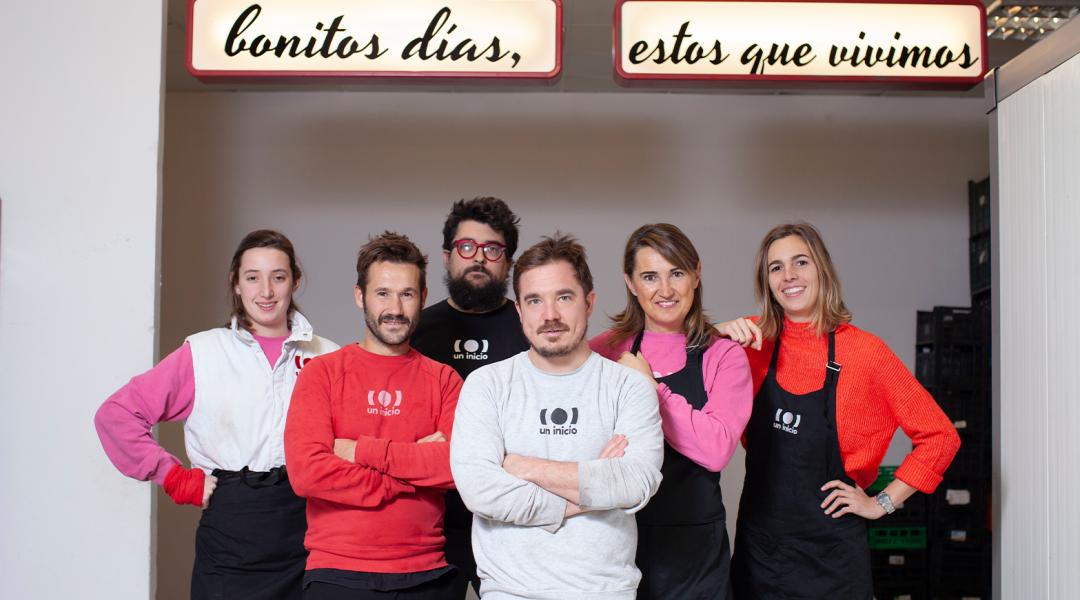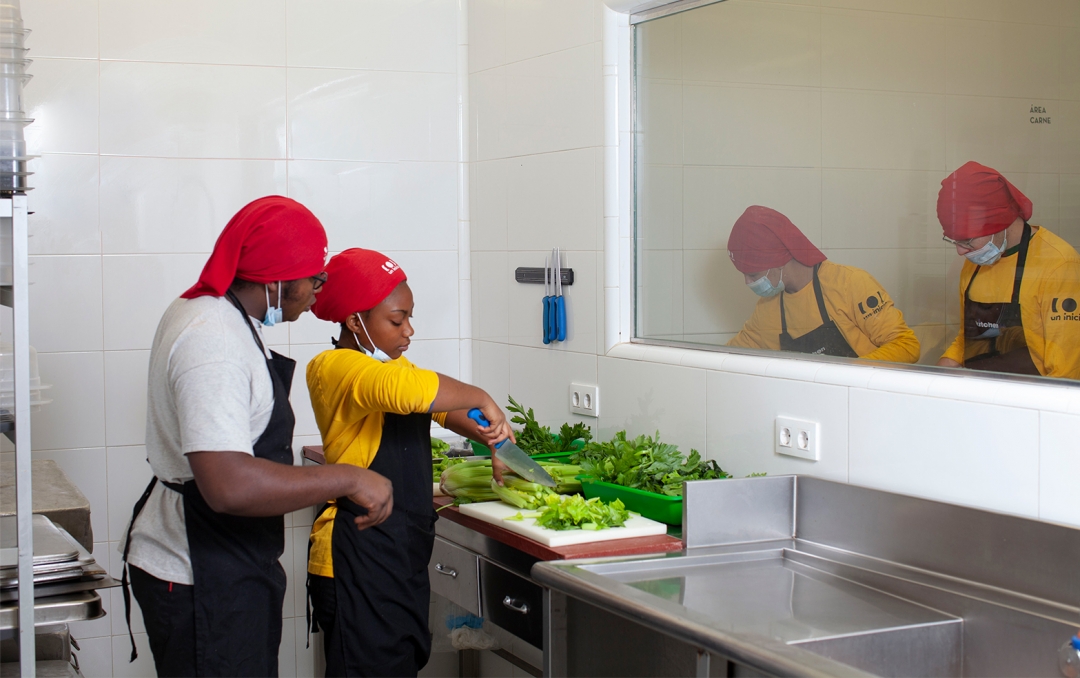UNINICIO
Gastronomy that Changes the World

Gastronomy, inclusion and commitment are the three foundations of UNINICIO; a non-profit social project aimed at training young people at risk of exclusion. A place where cooking boils down to opportunities.
On more than one occasion, chefs from across the globe have referred to the transformative power of cooking. From José Andrés to Gastón Acurio or Juan Roca. The fact is that, beyond culinary trends, show cooking and other gastronomic eccentricities that emerge online, the kitchen can also become, as is the case of UNINICIO, a place to defend equal opportunities and turn young people at risk of social exclusion into future entrepreneurs. Turning the tables on social issues in every sense.
On their website, UNINICIO presents itself as “a business and association under the same name” but, above all as “a social project set up to accompany, train, educate and employ young people from vulnerable groups or situations through gastronomy by producing convenience food and pre-cooked food for restaurants and catering services”.
The project began in 2015, when its director and strategic leader, Eduardo Rosello, who studied philosophy and was a teacher at the time, ran into a reality that is present in many juvenile facilities. “Every Sunday, several colleagues from work and I would go to play football at a centre. We realised that nobody was committed to the youngsters between 16 and 22 at a time that is vital for them, when what they should be doing is learning and committing to themselves. There’s nothing worse at that age than not having someone to boost your confidence”, he says. This revelation made him exchange chalk for an apron and go door to door looking for cooks who wanted to do their bit for the cause. “I visited about forty cooks. I had a special feeling with Dabiz Muñoz. I told him about the project I had in mind and asked to work as a dishwasher at DiverXO to learn the trade. He told me that if I wanted to learn how to cook, I should be in the kitchen from the start. And that’s what I did”, he recalls, laughing.
“We realised that nobody was committed to the youngsters between 16 and 22 at a time that is vital for them. There’s nothing worse at that age than not having someone to boost your confidence”
The financial support, which is crucial in these kinds of non-profit organisations, soon followed: “We were lucky to find a business angel who believed in the project and gave us enough money to present it at full scale to a Spanish social investment fund”, explains the director. To date, the project is based on two business branches: selling food to third parties and a catering service, which caters to all kinds of presentations, exhibition launches and private events. “We realised that the Spanish hotel market needed production centres to make an excellent product like ours, that’s how the project took shape”, he adds.

A typical day in the cold room at UNINICIO. © Kela Coto
La Nave 14, their headquarters and culinary production centre located on an industrial estate in the neighbourhood of Vallecas, sends out hundreds of kilos of vacuum-packed food, ready to serve in just a few steps, to restaurants across the country. 114,000 kilos per year, to be precise. Meat, stews, lentils, “flamenquines” (deep-fried Iberian ham and pork loin, of which they have sold 162,000) or rice dishes, the house speciality according to chef Rafael Cordón, head chef at UNINICIO, seasoned as the head of haute cuisine restaurant Gran Clavel. “Before joining the project, the most important thing for me was the dish that reached the table and the critique by whatever journalist or foodie that happened to be there. Now I have a much more humane vision of the job”, he explains. “My greatest satisfaction today is seeing how some of these kids end up working in Michelin Star restaurants or starting out on their own”. We should remember that most of them come to UNINICIO from juvenile centres and other associations within the Community of Madrid. None of them have finished school and, sometimes have to face the fact that they don’t know how to read or speak the language fluently. “Some of them are illiterate, but that doesn’t mean that they’re not clever. It simply means that they haven’t fit into the education system or that their families haven’t overseen their training”, explains Rosello.
21-year-old Michel Sinda is the head of the cold room today, a space where he trains new arrivals while he continues learning the ins and outs of the trade. He came to Spain from Cameroon fleeing the politics in his country and, one year later, heard about the project through the foundation where he took Spanish lessons. He confesses that although he hasn’t got the hang of paella, the project has opened doors to a future that seemed unlikely not long ago. “Getting to Spain wasn’t easy, and I can say that being here has changed my life. I’ve been given all the tools I need to start out on my own one day”, he says.
In La Nave’s kitchen it’s easy to catch the psychologist, the head of marketing and the rest of the team with their hands dirty, literally. At UNINICIO they learn, help and train among vegetables, pans and pulses. Every day, the young learners receive five hours of training, including activities aimed at promoting creativity, while they prepare the orders and catering that come in. “In any other factory, this would be done by machines; here we use our hands”, explains Cordón. One of their most powerful initiatives, called “¡Por fin lunes!” [Monday at last!], involves a prestigious chef visiting their facilities. “The chefs prepare dinner for them or teach them a recipe. Then, our students are in charge of calculating the costs and presenting the recipe to our guests, who are usually friends or family”, explains Rosello. Since the launch of the project, they’ve been visited by names such as Dabiz Muñoz, Quim Casellas, Silvio Salmoiraghi, Cheulhyeuk Choi, Xesc Reina, Javier Goya or Nacho Manzano. And the list grows year on year.
Consolidated today as one of the most established gastronomic non-profit projects in Spain, the UNINICIO family looks ahead with the same motivation and purpose as in its beginnings: training and guiding the future chefs of this country without asking for anything in return. “I believe that any art or discipline that involves prior awareness has the capacity to transform the world. Whether we’re talking about music or gastronomy,” declares Eduardo.









